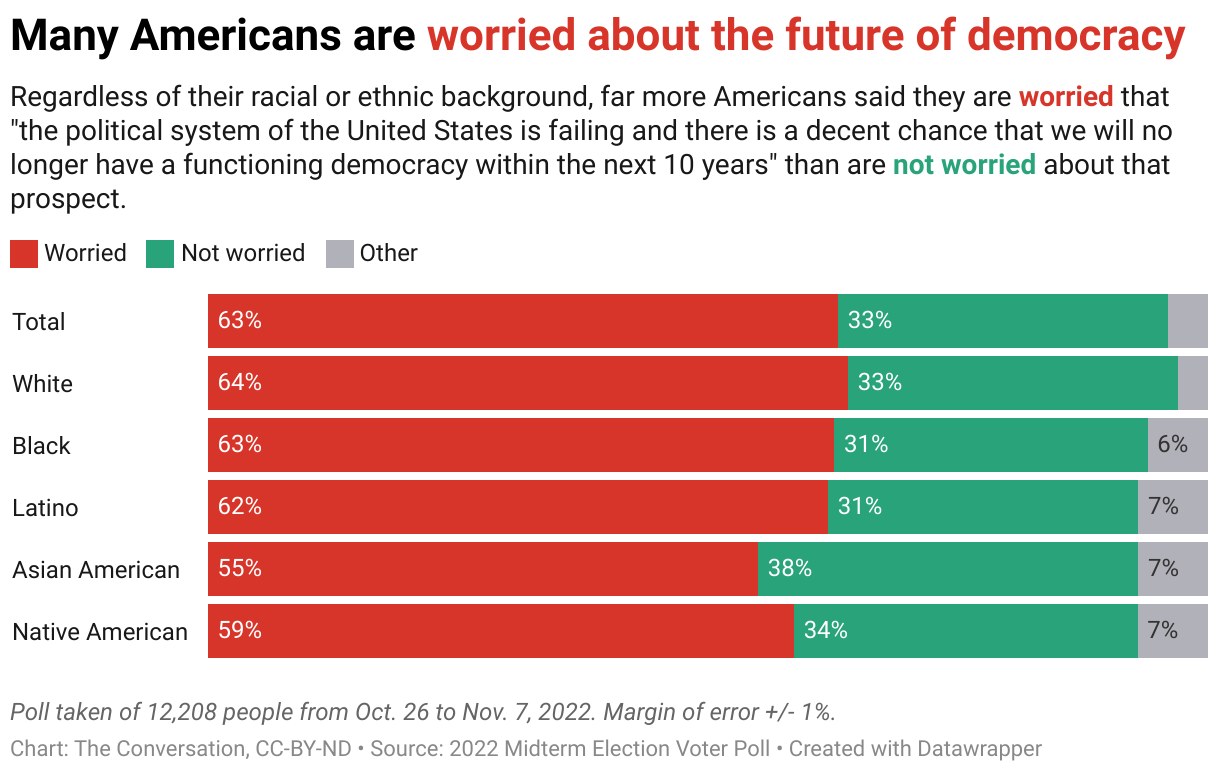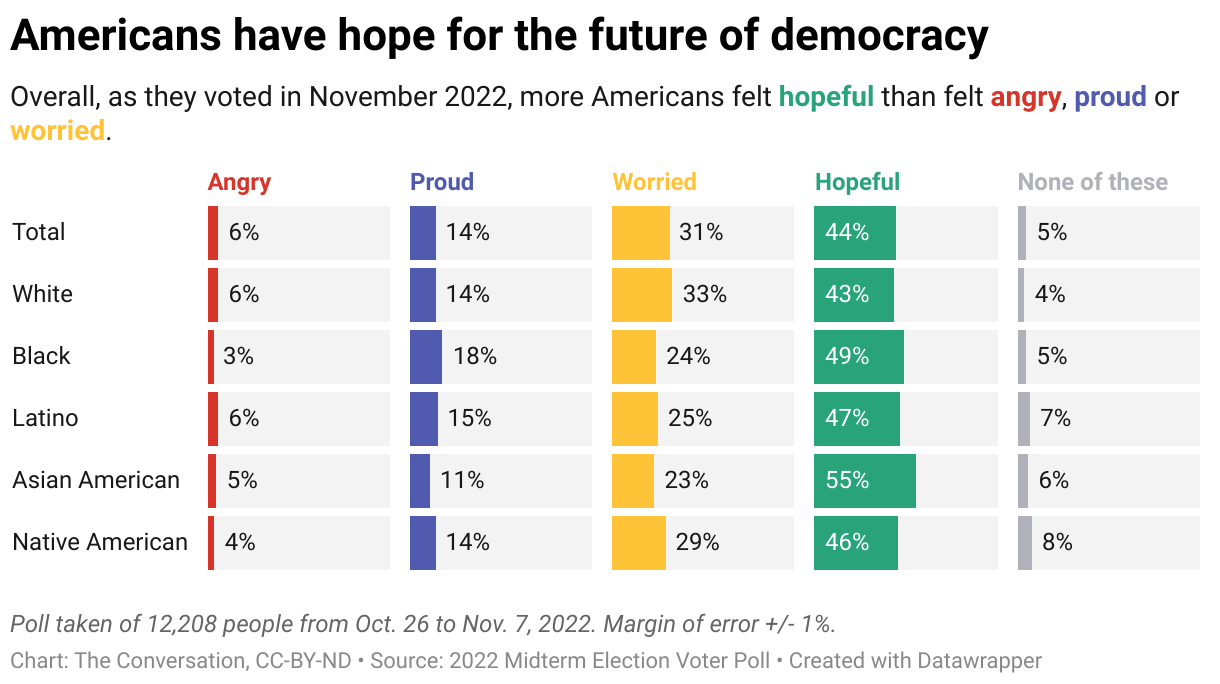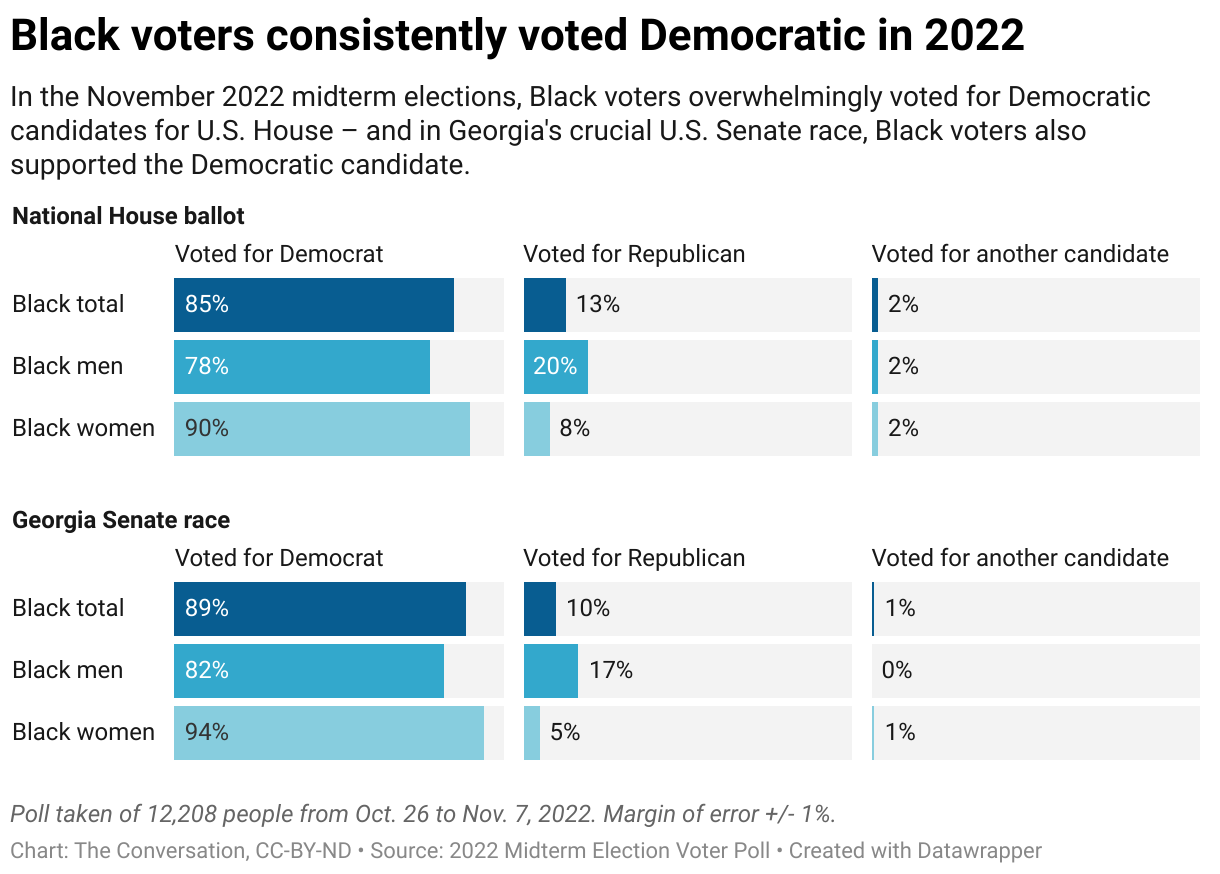On July 21, President Joe Biden announced his withdrawal of his reelection bid. Minutes later, he announced his full endorsement of Vice President Kamala Harris.

Despite worries about the substitution, happening just months before the election, Democrats nationwide responded with widespread support. In one week, Kamala Harris’s campaign raised over $200 million. When the Democratic National Convention (DNC) convenes this month in Chicago, Illinois, Americans and delegates will get another opportunity to “reflect, listen, and learn” about the messy business of democracy.
As political scientists, we have been doing something very similar. As a group, we have decades of experience studying politics—and we believe that not since the American Civil War has there been so much concern that American democracy, while always a work in progress, is under threat.
Indeed, survey trends point to eroding trust in democratic institutions. In addition to serving as a direct reminder of our political system’s fragility, the Jan. 6, 2021, attack on the Capitol and recent remarks by former president Donald Trump have provoked concern of the potential of democratic backsliding in the U.S.
In the fall of 2022, we listened to thousands of U.S. residents talk about their views on the state of American democracy. We found that, despite widespread fears over the future of democracy, many people are also hopeful, and that hope translated into “voting for democracy” by shunning election-result deniers at the polls. The groups that are most hopeful might surprise you: Asian American and Black voters, especially Black women.
Fears of a failing democracy
The 2022 midterms were the first nationwide ballot to take place after the Jan. 6 attack. The election provided a good opportunity to check in with potential U.S. voters over how they viewed the risks to democracy.
As such, in the fall of 2022, the African American Research Collaborative—of which one of us is a member—worked with a team of partners to create the Midterm Election Voter Poll. In an online and phone survey, we asked more than 12,000 U.S. voters from a variety of backgrounds a series of questions about voting intention and trust in national politics. Respondents were also quizzed over their concern about the state of American democracy.
On a five-point scale ranging from “very” to “not at all,” the survey asked how worried respondents were that “the political system in the United States is failing and there is a decent chance that we will no longer have a functioning democracy within the next 10 years.”

Roughly 6 in 10 Americans expressed fear that democracy is in peril, with 35% saying they were “very worried.”
Broken down by race and ethnicity, white Americans were the most concerned, with 64% expressing some worry that democracy is in peril. Black and Latino Americans were slightly less concerned. Asian Americans appeared the least worried, with 55% expressing concern.
Of the 63% of respondents who registered concern, more than half said they were “very worried” that democracy is in trouble and that it may soon come to an end.
Such fragility-of-democracy concerns can have a self-perpetuating effect; voters’ increasing lack of faith in their system can hasten the collapse in government they fear.
For example, negative attitudes about democracy can also destabilize voting habits—prompting some to skip elections altogether while motivating others to swing back and forth between candidates and political parties from one election to another. This pattern of voting can, in turn, lead to gridlock in government or worse: the election of cynical politicians who are less able—or even willing—to govern. It is a process that former Democratic Rep. Barney Frank of Massachusetts described in 2015 as the “self-fulfilling prophecy of ‘government doesn’t work.’”
Turning hope into action
But the story that emerged from our survey isn’t all doom and gloom.
In addition to confirming how endangered Americans believe their democracy is, citizens appear hopeful that their political system can recover. When given the prompt: “Overall, as you vote in November 2022, are you mostly feeling…,” more than 40% of the respondents—regardless of race or ethnicity—said they felt “hopeful.”
Indeed, “hope” was by far the most common feeling out of the four emotions that respondents were able to choose from. “Worry” was the second most typical emotion, with 31% of the total sample selecting it, followed by “pride” and “anger.” We’re sure a similar reaction was felt when Biden dropped from the presidential race, leaving a little over 100 days to rally behind the first Black woman presidential nominee.
Rather than resigning themselves to a lost democracy, the results indicate that voters from a broad array of demographic and political backgrounds feel hopeful that American democracy can overcome the challenges facing the nation.

Black Americans were among the most hopeful (49%), second only to Asian Americans (55%), while white Americans were the most worried (33%). These racial and ethnic differences are consistent with recent research on how emotions can shape politics.
Those results also make sense in the context of the trajectory of race relations in the U.S. Black people have borne the brunt of what happens when authoritarian forces in this country have prevailed. They have suffered firsthand from anti-democratic actions being used against them, depriving them of the right to vote, for example. Throughout U.S. history, stories of racial progress often reveal a struggle to reconcile feelings of hope and worry, particularly when thinking about what America is versus what the nation ought to be.
Such hope in democracy has turned into action. Efforts to counter GOP-led attempts to suppress votes are encouraging signs of citizens combating anti-democratic measures, while punishing parties deemed to be pushing them.
Take the example of Georgia, which has “flipped from Republican to Democrat” in large part because of voting rights activist and Democratic politician Stacey Abrams’s tireless mobilization efforts. In the midterm election, GOP Senate candidate Herschel Walker underperformed among Black voters, winning less of the Black vote than GOP candidates in other states.

The breaking of the Republican stronghold in Georgia fits with a broader theme of Black voters casting ballots to “save democracy,” as scholars writing for the Brookings Institution think tank put it. In rejecting anti-democratic measures—and representatives of the party held responsible—in Georgia, “Black people were the solution for an authentic democracy.”
Black women deserve the most credit here, consistently voting for pro-democracy candidates. Not surprisingly, when broken down by race and gender, our survey shows that Black women are most hopeful (56%), some way ahead of white men (43%), with Black men and white women both at 42%.
We saw that hope in action recently, when Black women voters raised over $4 million on Zoom for Kamala Harris the night she announced her campaign, leading the charge for other racial and ethnic groups to follow suit.
A democracy, to keep for good
Democracy has long been a cherished ideal in the U.S., but one that from the country’s founding was perceived to be fragile.
When asked what sort of political system the Founding Fathers had agreed upon during the Constitutional Convention of 1787, Benjamin Franklin famously replied: “A republic, if you can keep it.”
While acknowledging that the success of our government isn’t promised, Franklin’s words serve as a reminder that citizens must work relentlessly to maintain and protect what the Constitution provides.
What we’ve discovered, both from our survey and from how people voted, is that Americans are sending a clear message that they support democracy, and will fight anti-democratic measures—something that politicians of all parties might benefit from listening to if we want to keep our republic.
This article was updated and revised from a piece that originally appeared in The Conversation.







Comments